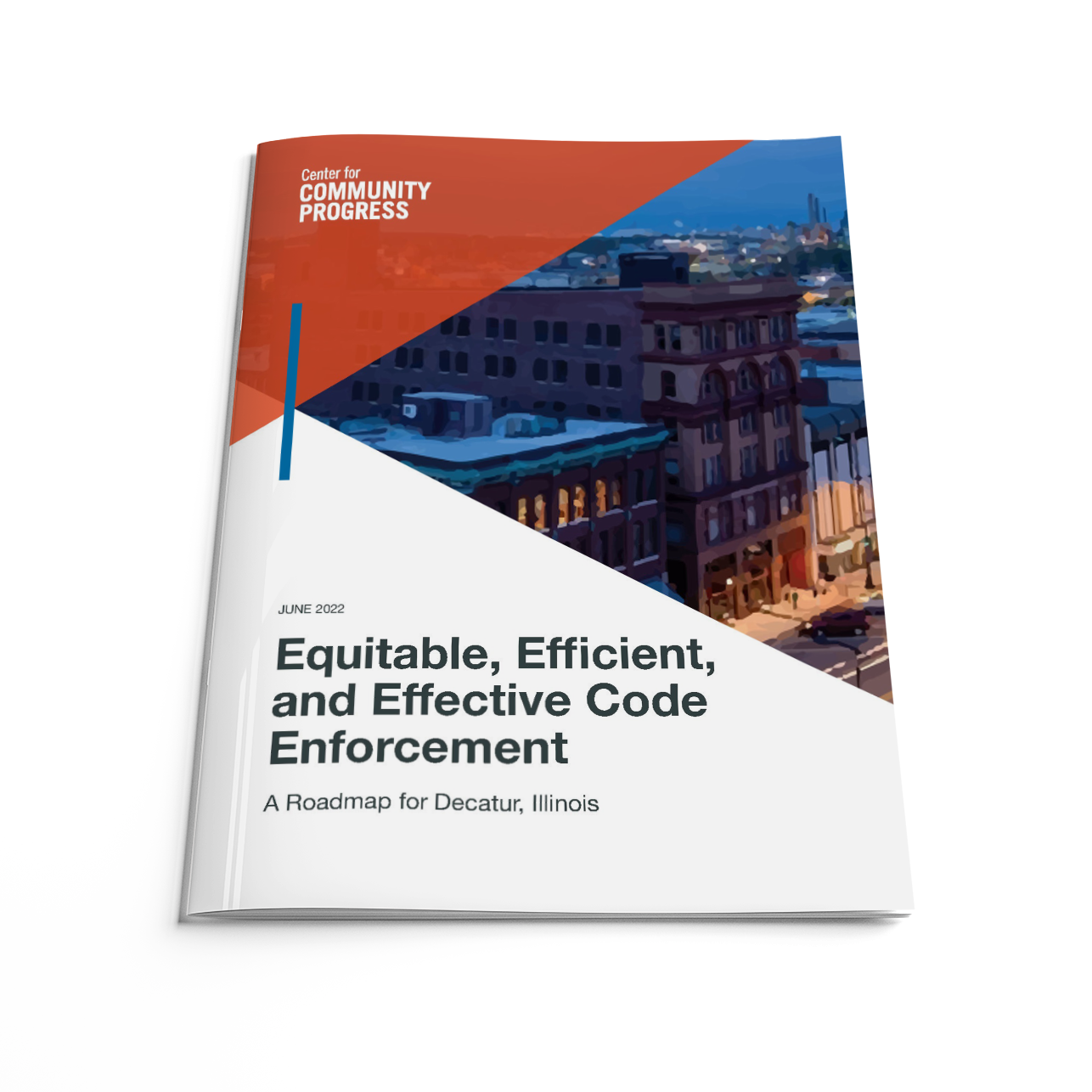
Equitable, Efficient, and Effective Code Enforcement
A Roadmap for Decatur, Illinois
Topic(s): Code Enforcement System
Published: June 2022
Geography: Illinois
Author(s): Center for Community Progress
Nestled in the heart of Illinois, Decatur is a legacy city that has weathered decades of neighborhood and economic adversity. Not only are City of Decatur (City) officials seeking ways to address long-term challenges, they are also addressing the recent health and economic impacts of a global pandemic on Decatur residents. Despite these challenges, there are opportunities for hope and optimism—the City can draw on unprecedented temporary federal, state, and other resources to assist with recovery. They are dedicating significant resources to addressing the Decatur City Council’s number one priority: the health and vitality of its neighborhoods.
As a part of this commendable investment, the City entered into an agreement with the Center for Community Progress to assess and recommend changes to its existing approach to housing and building code enforcement, a key component of the City’s effort to stabilize and reinvest in Decatur’s neighborhoods. The City’s Department of Community Development (DCD) was Community Progress’ primary point of contact on this project given their role in administering—along with the City’s legal department and other partners—most housing and building code enforcement activities.
The City of Decatur engaged Community Progress in the first six months of 2022 to provide recommendations for a more updated code enforcement system. Because the City was interested in exploring new, innovative approaches to code enforcement and focusing on strategies that centered racial equity, Community Progress agreed to match the City’s investment using funds from its Technical Assistance Program for Equitable Recovery (TAPER) initiative. This initiative allows Community Progress to support communities seeking equitable approaches to code enforcement and delinquent property tax enforcement.
Community Progress:
- Reviewed state and local law and local policies related to the enforcement of housing and building codes.
- Reviewed data related to the City’s code enforcement activities and neighborhood demographics, as well as recent reports summarizing housing and other property-related data to understand challenges related to vacancy, property ownership, local housing markets, and property conditions.
- Reviewed documents supplied by DCD related to DCD priorities, operations, and staffing.
- Visited Decatur to speak with dozens of local stakeholders, including the city manager’s office; DCD
- management and staff; leaders and staff from the City’s legal department (Legal), the City’s information technology (IT) team; the fire department; the police department; leaders from neighborhood associations through the Coalition of Neighborhood Organizations (CONO); and a group of local Realtor and business leaders.
- Conducted follow up and virtual interviews with stakeholders from DCD, Legal, IT, community leaders, and the Macon County Clerk.
- Drew on our knowledge of national best practices and creative interventions to minimize the negative impacts of problem properties
These activities informed development of this final report, which includes a brief assessment of the City’s existing approach but primarily outlines a framework and recommendations for how code enforcement can more equitably, efficiently, and effectively address the negative effects of problem properties on Decatur residents and neighborhoods. This report and recommendations are intended to compliment the City’s and its partners’ efforts to reimagine how they invest in Decatur neighborhoods.
Community Progress’ recommendations fall into the following three categories:
- Establish Clear Priorities and Improve Data Collection and Analysis
The first series of recommendations highlights key areas where the City can lay a foundation to support a move from a reactive, output-driven code enforcement approach, to one that is equitable, efficient, and effective. - Invest and Build Community Capacity Through Education, Outreach, and Resource Development
Our second series of recommendations revolve around strategies and initiatives to help educate, build relationships, and partner with community members and organizations. - Create New Programs to Address Specific Problem Property Types
One of the most important parts of designing a code enforcement approach is recognizing that the types of strategies used to address vacant properties must differ from those that address occupied properties. Ourr ecommendations highlight the need to create new code enforcement programs to address the three types of problem properties that are causing the most harm in Decatur: (1) vacant structures; (2) substandard occupied rental properties, and (3) substandard owner-occupied properties.
Topic(s): Code Enforcement System
Published: June 2022
Geography: Illinois
Related Publications
Other Related Content
Subscribe to join 14,000 community development leaders getting the latest resources from top experts on vacant property revitalization.
